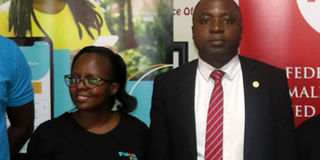How technology can help out with traffic jam and pollution challenges

Ms Susan Mugyenyi Ataremwa (left), a tech entrepreneur and the founder of the Funaride App (second left) and the Executive Director of Federation of Small and Medium sized Enterprises (right) pause in a group picture after the news conference at the Federation of Small and Medium sized Enterprises (FSME) headquarters in Kampala.
What you need to know:
Uganda losses Shs500m daily in traffic jam, according to Kampala Capital City Authority (KCCA).
Travellers lose between 8 and 23 hours every month in traffic jams, with car travel speeds falling from an average of 28 km/h when there is no jam, to between 8 and 14km/h because of traffic jams, according to Uganda Management Institute research.But just like businesses, individuals also suffer the worst experiences, as they get trapped in traffic gridlock for many hours especially during peak time to either enter or exit the city.
Kampala Capital City Authority (KCCA) estimates that at least 24,000 man-hours are lost every day by commuters due to traffic jams. A man-hour is the amount of work performed by the average worker in one hour.
Kampala traffic jam can be nauseating most times. Time and again it is self-inflicted.
It is also no secret that part of the reason for the routine rush hour jam is the improper infrastructure coupled with poor planning.
But did you know that as the country wait for the government grand plans to take shape there are practical solution aided by technology that can considerably reduce the rush hour traffic and the air pollution that comes with it.
With the help of technology and innovative minds behind it, there is no reason anymore as to why a vehicle with a seating capacity of four passengers or more should drive to or through the city centre or even beyond (such as up country journeys) with no cost-sharing passengers on board.
According to Ms Susan Mugyenyi Ataremwa, a tech entrepreneur and the founder of the Funaride App, there is now no reason for hundreds, if not thousands of vehicle to hit the city centre, causing congestion and pollution, to do so in the way it does.
With Funaride App, which is a local solution to the teething traffic jam and increasing pollution problem, carsharing/pooling as well as connection of drivers and passengers in the same area code heading to the same direction, is no longer a mystery.

This means that instead of having so many cars hitting the streets every morning and evening, you now need just a few vehicles to do the job. As a result, minimizing the congestion and pollution challenges.
Already, Ugandan motorists’ desire to give a ride to even strangers is evident. This innovation by a Ugandan young mother and her team is simply formalising the arrangement in terms of accountability, traceability and responsibility of each party.
So you know…
In many African cities, including Kampala, modern public transport is still wanting in many ways. Informal transport systems such as the 14-seater minibuses commonly known as taxis and boda bodas (motorbike taxis) continue to dominate the streets in the most insane manner most of the times.
This insanity has resulted into not only traffic congestion but also air pollution. In case of accidents like fire or health related emergencies, it is tiring if not self-defeating to wade through the traffic congestion as more often than not you will most likely hit a dead end before accomplishing the rescue mission.

Ms Susan Mugyenyi Ataremwa, a tech entrepreneur and the founder of the Funaride App during the news conference at the Federation of Small and Medium sized Enterprises (FSME) headquarters in Kampala.
The average speed of vehicles in the Greater Kampala Metropolitan Area is 25.9 km/h due to poorly planned road networks, and poor traffic management that result in traffic congestion and as a result, it is estimated that over 24,000 man-hours are lost in traffic jams each year.
“With aforementioned situation where is the value for money,” the Federation for Small and Medium Sized Enterprise (FSME) executive director, Mr John Walugembe wondered while presenting the Funaride App in a news conference at the FSME headquarters in Kampala last week.
Funaride is currently active with private drivers being connected to passengers heading to the same direction. And unlike most of the ride hailing Apps in Uganda, Funaride is a shared platform that gives chance to every person with a car to not only share the cost at their convenience, but be part of a noble cause to reduce congestion and pollution.
Screening
For drivers you will have to subscribe, get approved before starting operations. As a driver you will be required to have both a valid driving permit and national Identity card (ID) that you must upload, then schedule your journey plan.
When a passenger schedules their journey plan, the App connects him/her to an available driver heading to the same direction and if no driver is available at the moment, you are put in a queue until one is available. Meanwhile a passenger details, particularly registered phone number is a must for transaction to be completed.





